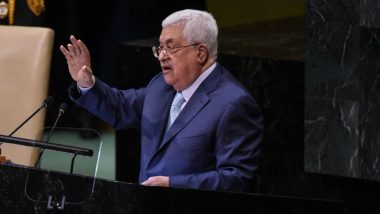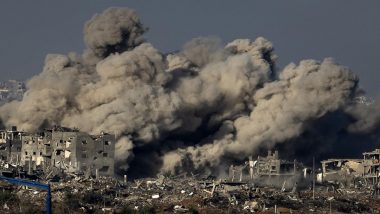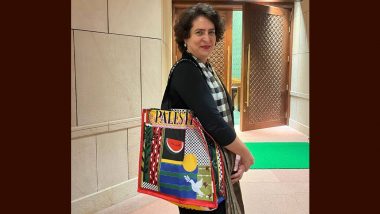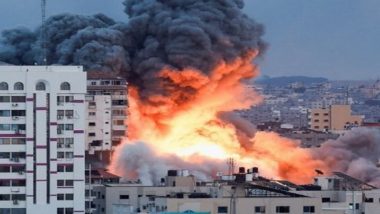Ramallah, January 17: Smashed doors, dusty tables and 12 years of unread mail -- welcome to the defunct Palestinian parliament. It has been more than a decade since the Palestinian Legislative Council (PLC) last met, due to infighting between Palestinian president Mahmud Abbas's Fatah and Islamists Hamas. The two sides are currently talking up the prospect of new elections -- the first since 2006 -- but for now the key Palestinian political institution, located in the occupied West Bank, lies empty.
It is mid-morning on a recent week day in Ramallah but the hundreds of spaces in the parliament's car park hold just a few dozen vehicles. The main door to the parliamentary chamber is shuttered, with an armed police officer standing guard. A back route leads through a partially smashed glass door. Inside the chamber, dust gathers on rows of empty seats around a central speaker's dais. Palestine: President Mahmoud Abbas Declared Fatah Party’s ‘Only Candidate’ for Upcoming Presidential Poll.
In the parliamentary offices next door, the postman still delivers mail to the lawmakers' boxes, but many haven't been checked in years. The most senior figures, including chief Palestinian negotiator Saeb Erekat, have the largest piles.
No One to Serve
In 2004 the shiny new parliament building was opened in central Ramallah, the Palestinian city in the occupied West Bank 10 miles (16 kilometres) north of Jerusalem. Construction was largely funded by Japan and was intended to symbolise a return to democracy after the bloody Palestinian intifada, or uprising, against Israel in the early 2000s. It only saw one general election, in 2006, when Hamas won an unexpected victory.
The Islamist party won 74 of the 132 seats, while Abbas's secular Fatah got 45. Hamas, which does not recognise Israel's right to exist, is considered a terrorist organisation by the United States and European Union. Many countries refused to accept the election result. A year later Hamas seized the Gaza Strip from Abbas's forces in a bloody conflict that verged on civil war.
With lawmakers at each others' throats, parliament was suspended in 2007. Most politicians stopped turning up but kept receiving salaries of about $3,000 a month -- in a territory where nearly a quarter of people live in poverty. About 120 civil servants at the parliament in Ramallah and dozens more in Gaza continued working, awaiting better days.
They still receive salaries but have no one to serve, said Rasha Kawas, who has worked for the PLC for more than 20 years. The parliament retains some official roles -- including coordinating with others in the Arab world and beyond. There are parliamentary panel discussions, visits by school students and the occasional citizen looking for assistance.
Committee work continues "at a different rate", said Ahmed Abu Dayyeh, who organises parliamentary task forces. But more often than not there is nothing happening at all, one employee said. Official working hours are between 8am and 3pm, though these were "a bit flexible", the employee added.
So what do they do all day? He gestured to his phone. For her part, Kawas said: "When there are any activities we are very happy. We feel we are working."
Back to Life?
Since parliament last met, 84-year-old president Mahmud Abbas has ruled by decree, passing about 300 laws, according to Abu Dayyeh. In Gaza, however, Hamas set up a rival government and Abbas's decisions have no effect there. Arif Jaffal, director of the Arab World Democracy and Electoral Monitor (Al-Marsad), said 13 years without a parliament had seen Abbas concentrate power in his hands, while the judiciary and other checks have been weakened.
"This led to a political system standing only on one leg," he said. In late 2018, Abbas pledged to permanently dissolve the parliament and call new elections. But in practice both the West Bank and Gaza, while theoretically in favour of elections, are able to operate without them while their differences remain unresolved.
Other challenges also hamper plans to hold elections. Abbas recently formally asked Israeli authorities to allow voting to take place in east Jerusalem, which remains predominantly Palestinian, though Israel has yet to respond.
Israel seized control of Palestinian east Jerusalem in the 1967 Six-Day War and considers the whole of the city its undivided capital. But the Palestinians claim east Jerusalem as the capital of their future state.
Ammar Dweik, general director of the Palestinian Independent Commission for Human Rights, said new elections could be the route to "reunification" of the Palestinian political system. But he warned getting there remained a challenge, with fears that elections could spark fresh tensions.
"These elections must be handled carefully due to the fragility of the political environment," he said. In the parliament, staff retain hope for a breakthrough which could see them regain their purpose. "We see that there is a stronger political will than ever before to hold elections and bring life back to the Legislative Council," Abu Dayyeh said.
(The above story first appeared on LatestLY on Jan 17, 2020 09:45 AM IST. For more news and updates on politics, world, sports, entertainment and lifestyle, log on to our website latestly.com).










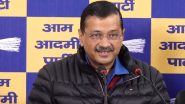


 Quickly
Quickly









